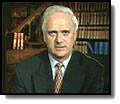Irish Election Could Affect Peace Process
Irish Prime Minister John Bruton has signalled a June general election and he is expected shortly to formally request that President Mary Robinson dissolve the Dail, the Irish parliament, in readiness for a polling day in the first week of next month.
Any change of power in Ireland so quickly after the British General Election
could have serious implications for the sensitive peace process negotiations.
Opinion polls suggest that Fine Gael Party leader, Mr Bruton, and his coalition government are in for an up hill struggle to retain their position. The main opposition party, Fianna Fail, looks to be gaining support and may form an alliance with the smaller Progressive Democrats Party.
Fianna Fail leader, Bertie Ahern, has said that if elected, he would set up immediate meetings with Sinn Fein Leaders without a ceasefire as a pre-reqisisite. This is contrary to Mr Bruton's administration which has held the 'ceasefire first' principle as a key policy plank of the peace negotiations since the breakdown of the last IRA ceasefire in February 1996, when the terrorists bombed London's Canary Wharf.
The 'ceasefire first' line has the backing of the new British Labour government with Northern Ireland Secretary Mo Mowlam insisting on a renewal of the ceasefire before Sinn Fein can enter the negotiations.
The 1992 Election
The last Irish General Election was in November 1992 when it led to a government formed by Fianna Fail and the Irish Labour Party, under the premiership of Albert Reynolds who was central in negotiating a peace process policy.
That administration collapsed after two years and was replaced by Mr Bruton's
current three-group partnership, dubbed the "rainbow coalition" by its
political opponents.
|

